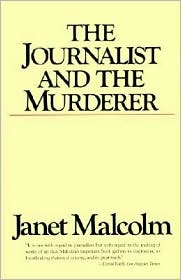
Malcolm's book is ranked at #97 on the Modern Library's "100 Best Nonfiction Works of the 20th Century."
In 1989, Janet Malcolm packed a mighty punch with a single sentence: “Every journalist who is not too stupid or not too full of himself knows what he does is morally indefensible.” That was the first line in her famous (and infamous) much-debated book, The Journalist and the Murderer, which began as a New Yorker article.
In the essay, Malcolm examined the relationship of scribe Joe McGinniss and killer Jeffrey MacDonald, an Army officer and physician who murdered his pregnant wife and two daughters. McGinniss befriended the murderer and pretended to be sympathetic to him, though he thought MacDonald was guilty and was just collecting information for his eventual bestseller, Fatal Vision. Malcolm had other issues with McGinniss, but the central question was and is: Are journalists unethical for betraying their subjects’ faith in the pursuit of truth, even if those subjects are horrifyingly immoral?
Malcolm’s ideas on the subject are very broad and she may have been exorcising her own demons (she can be a mean take-down artist), but the central question is worth investigating. Here’s an excerpt of the rest of the paragraph that immediately follows her infamous first sentence:
“He is a kind of confidence man, preying on people’s vanity, ignorance or loneliness, gaining their trust and betraying them without remorse. Like the credulous widow who wakes up one day to find the charming young man and all her savings gone, so the consenting subject of a piece of nonfiction learns–when the article or book appears–his hard lesson. Journalists justify their treachery in various ways according to their temperaments. The more pompous talk about freedom of speech and ‘the public’s right to know’; the least talented talk about Art; the seemliest murmur about earning a living.”
